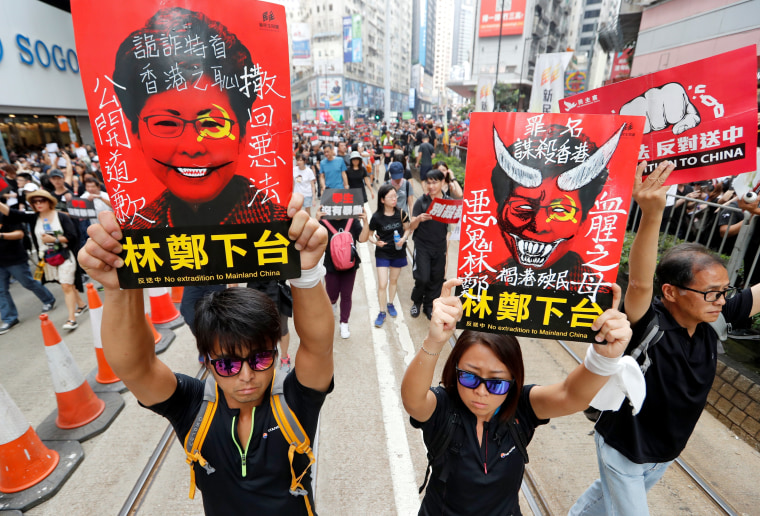HONG KONG — Hundreds of thousands of black-clad demonstrators took to the streets of Hong Kong on Sunday to demand an end to a proposed extradition bill and call for the resignation of the city's embattled leader.
Protest organizers say that nearly 2 million people were in the massive crowd on Sunday, which would make it by far the biggest demonstration in the history of Hong Kong, a territory of around 7 million people. Police, however, say the official count was 338,000 at the protest's peak.
Demonstrators carried white flowers and others held banners saying, "Do not shoot, we are HongKonger," in a bid prevent the sort of violence that accompanied protests in the semi-autonomous Chinese territory on Wednesday.
In a big concession, the territory's government apologized "to the people of Hong Kong" on Sunday night.
Hong Kong's Chief Executive Carrie Lam "admitted that the deficiencies in the government's work had led to substantial controversies and disputes in society, causing disappointment and grief among the people," according to an official statement.
On Saturday, Lam had announced the government would suspend debate on the controversial extradition bill — another major victory for protesters in the former British colony.
As night fell hours after the procession began, protesters were still leaving the starting point of the march, Victoria Park. Crowds had grown so big that they took over roads that were not part of the original, police-approved march route, bringing large areas at the heart of the city to a standstill.
When hundreds of thousands marched in Hong Kong last week, crowds demanded the extradition bill be withdrawn and for Lam to step down. Now anger towards police has grown, and many held flowers in honor of a man who fell to his death while staging a solo protest on the roof of a mall on Saturday night.
“We have more demands this time. Last time we only cared about the bill," said Ken Poon, 26. "This time we are protesting police violence, too."
Download the NBC News app for breaking news and politics
"Did they really need to use tear gas and rubber bullets in that situation? I think there are even more people out this time, maybe because of what the police did,” added the engineer.
In sharp contrast to last week's protests, a police presence is almost nonexistent.
Organizers have said they would not back down until the bill was removed altogether, and many in the crowd chanted, "Withdraw!"
Throughout the day protests were largely orderly, with crowds parting to make way for ambulances and the city's double-decker buses. In places, people sang "Sing Hallelujah to the Lord,” the protesters' unofficial anthem.
Demonstrator Janice Leung, 26, became emotional when she said she was “not satisfied” with Lam’s Saturday response.
“Why is it as if she’s the only one in the world who doesn’t understand? She must step down," the IT professional said.
"Even if she doesn’t, once she withdraws the bill, she won’t last long — 'upstairs' won’t allow it," Leung added, referring to Lam's official backers in Beijing.
That Lam did not condemn police violence has angered many, including Leung. She called on officials to apologize for the treatment of demonstrators, particularly the firing of rubber bullets and tear gas into crowds. The clashes saw more than 70 people hospitalized.

“I want the police to apologize for the violence they committed against young people. And for the bill to withdraw," she said. "That is a very clear demand, and not negotiable.”
Lam's backtracking on the extradition bill followed warnings from Western officials, with international business and human rights groups saying the changes would hurt the rule of law in Hong Kong, which was handed back to Chinese rule in 1997 amid guarantees of autonomy.
Hong Kong enjoys greater freedoms than mainland China under a "one country, two systems" framework. Residents can freely surf the internet and participate in public protests, unlike in the mainland. Protesters believe this autonomy could be at risk if Hong Kong imposes the bill, which Lam has now withdrawn, but did not cancel.
Also at stake is Hong Kong's reputation as an Asian financial hub, and some of the island's tycoons have already started moving their wealth offshore.
Protesters who stayed after the march’s end peacefully occupied the roads in front of the government’s main offices, remaining as the night wore into the early hours of Monday. The occupation echoes pro-democracy protests in 2014 that brought key parts of the city to a standstill for 79 days.